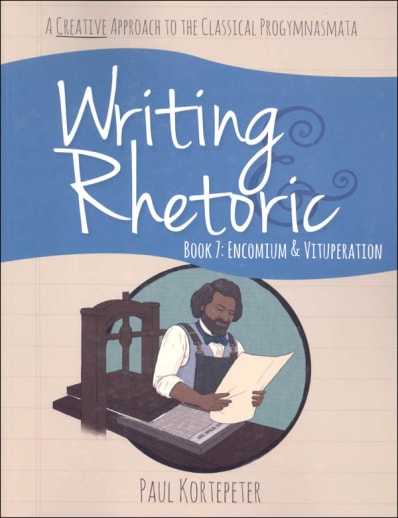The Student Books provide instruction and examples with plenty of space to write. Includes fourteen lessons that use encomium (praising a person, thing, or idea and then backing up the praise with solid arguments) and vituperation (speaking against a person, thing, or idea; likewise providing solid arguments). Source materials are important narratives from the Civil War era and the period of westward expansion. Students will be writing well-crafted, six-paragraph persuasive essays and guided through the process of writing a brief biographical research paper.
Writing & Rhetoric Book 7: Encomium & Vituperation Student Edition
Description
A one-semester course for grades 6 or 7 and up
Think of the progymnasmata as a step-by-step apprenticeship in the art of writing and rhetoric. In the Writing & Rhetoric series, author Paul Kortepeter has recovered this proven method of teaching writing in conjunction with critical thinking and speaking.
Encomium & Vituperation
What is an encomium and a vituperation? An encomium is a short essay praising the virtues of someone or something; a vituperation is a critical essay that reveals faults. In addition to guiding students through the writing of their own essays of praise and criticism, this book also leads your students step by step through a research project about a fascinating person. While students are learning about a remarkable life, they will also be learning how to learn. This research is achievable and the natural next step as students gain the skills of reading a variety of texts on a research subject, taking notes, creating an essay from these notes, and citing their sources.
In this one-semester book, students will learn to:
* Discern the main idea
* Use hyperbole and thesis
* Incorporate background and supportive detail
* Understand the difference between the genres of biography and autobiography
* Note the good and poor qualities present in a person or event
* Contrast different behaviors after weighing their merits
* Craft effective conclusions that encourage readers either to emulate or avoid specific behaviors
* Learn to write a research paper in all its parts, including making notecards, outlining, integrating sources, and citing sources
Fourteen lessons that use encomium (praising a person, thing, or idea and then backing up the praise with solid arguments) and vituperation (speaking against a person, thing, or idea; likewise providing solid arguments). Source materials are important narratives from the Civil War era and the period of westward expansion. Students will be writing well-crafted, six-paragraph persuasive essays and guided through the process of writing a brief biographical research paper.
| Product Format: | Paperback |
|---|---|
| Grades: | 6-7 |
| Brand: | Classical Academic Press |
| ISBN: | 9781600512988 |
| Length in Inches: | 11 |
| Width in Inches: | 8.5 |
| Height in Inches: | 0.6875 |
| Weight in Pounds: | 1.875 |

